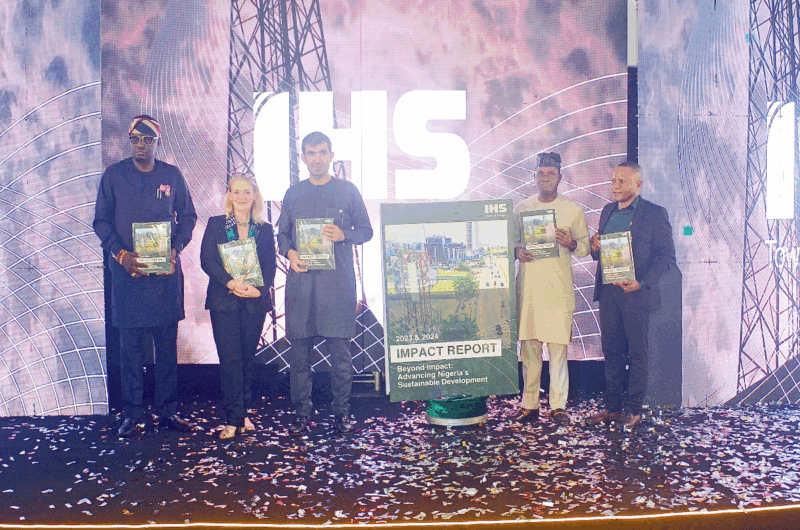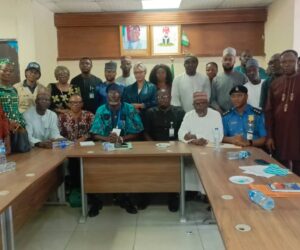It takes only one glance at Nigeria’s daily news headlines—high inflation, failing infrastructure, and broken systems—to believe that companies are in business only to extract and not to invest.
But IHS Nigeria’s latest Impact Report 2023–2024, launched in Lagos on Thursday, September 25, 2025, cut through the cynicism, revealing actual impact, not corporate lip service.
The company has spent N5.4 billion across 160 projects, touching every state and local government in the country.
At the launch, attended by government officials, development partners, and industry leaders, IHS Nigeria placed its measurable footprint on the table: digital skills for over 108,000 Nigerians, internet access for 956 schools, 9 oxygen plants across states, 4,000 trees planted, and over 20,000 residents given clean water through solar boreholes in Borno.
The event was the first time IHS publicly launched an impact report, and the CEO Mohamad Darwish said this was deliberate. “This evening is not just to talk about IHS or present a report but rather it is about telling a story of giving back,” he said.
“Our stakeholders in IHS cannot just be shareholders, customers, suppliers, and employees. The communities we operate in have to be at the front and centre of our stakeholders list. We have a duty to create better conditions for people and communities to thrive today and for generations to come.”
Darwish recalled how the company’s visible support for the Federal Government’s 3 Million Technical Talent (3MTT) initiative prompted other corporates to follow suit. “Because IHS was first to support FG’s 3MTT initiative and it was publicised, other companies within and outside the sector jumped on the wagon,” he noted.
The IHS Nigeria Impact Report 2023–2024 is anchored on IHS Towers’ four sustainability pillars—ethics and governance, environment and climate change, education and economic growth, and people and communities—while aligning with nine of the UN’s Sustainable Development Goals and Nigeria’s Renewed Hope Agenda.

Impact in Numbers
Dapo Otunla, senior vice president for Sustainability and chief corporate services officer, at IHS Nigeria reeled off commendable figures:
- N5.4 billion invested in 2023–2024 alone.
- 160 projects implemented nationwide, with a total spend of N11 billion since 2020.
- 956 schools connected to the internet.
- 1.7 million learners reached through the Nigerian Learning Passport.
- 20,000 beneficiaries of solar-powered boreholes in Borno, helping flood-displaced families return home.
- 201 hydrocele surgeries and treatment for over 1 million people with neglected tropical diseases.
- Over 14,000 children immunised, 13,800 girls empowered through digital education, and 205 young female innovators upskilled.
- 239 pints of blood donated by staff.
- Nearly 24,000 residents benefiting from solar streetlights across eight states.
“This report, and more importantly the stories that are inside, really gives a lot of pride and joy to IHS, to me personally, and every staff at IHS, for what we have achieved in terms of giving back to the communities that we operate,” Darwish said in a post-event interview.
Partners Speak
Government and partners present testified to IHS Nigeria’s unique approach. Dr Dapo Ademola Adesina, special adviser for Technical and Vocational Education in Osun State, commended the corporate culture: “I see IHS as touching lives, touching communities. This is very remarkable. If we can duplicate this all around the country, it’s been good, because technical and vocational education is big now—it’s the next big thing.”
Celine Lafoucriere, chief of UNICEF’s Southwest Nigeria Office, called IHS a “unique private sector partner”:
“IHS Towers has been working with us in many fields, including health, access to water and sanitation, and young people’s transition from learning to earning. IHS very much shares our ethical values and the drive to make sure that those communities can not only survive but thrive in Nigeria.”
She, however, flagged climate education as the next frontier: “There is no Planet B. To educate the youth of today to acquire green skills for greener jobs… is extremely important. The whole orientation that IHS Towers is giving to its sustainability work is perfectly aligned with the one we have.”
Internal Perspective
For staff, sustainability is not a side project. Ayotade Oyinlola, chief HR Officer of IHS Towers, stressed: “What we do in terms of giving back is about impact, not publicity. Wherever we have our towers—and that’s 16,000 towers strong—we should give something meaningful to the community in which we operate.”
Employees, he explained, propose initiatives from their communities which are then vetted, funded, and scaled: “We look at how sustainable these initiatives will be in the long run. And we go for it.”
The impact report frames IHS Nigeria not just as an infrastructure company but as a social investor. Dapo Otunla, further stated, “We believe in the power of the community and in empowering our people to help them unlock their full potential. Our interventions cut across the six geopolitical regions in Nigeria.”
Darwish, closing his address, reframed what success should mean in Nigeria’s corporate spaces:
“The report we unveil today is a testament to what is possible when a business redefines success not just by profit margins, but by the positive impact it creates.”
The cocktail session ended with a collage of images: schoolchildren holding tablets, women drawing water from solar boreholes, frontline workers in scholarships, and oxygen plants saving lives.
A visual reminder that in a country where corporate social responsibility usually stops at branded T-shirts and photo ops, IHS Nigeria has gone deeper, into oxygen, clean water, digital futures, and hope.








